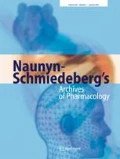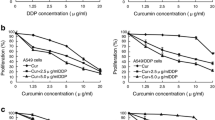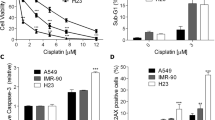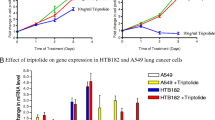Abstract
Cisplatin is a well-studied and widely used chemotherapeutic agent and is effective in the treatment of the advanced human non-small cell lung cancer (NSCLC). Curcumin is a yellow pigment derived from the rhizome of Curcuma longa and has been proved to have antioxidant and antitumor properties. XRCC1 is an important scaffold protein involved in base excision repair and plays an important role in the development of lung cancer. In this study, we characterize the role of curcumin in the cytotoxicity, p38 MAPK activation, and XRCC1 expression affected by cisplatin in NSCLC cells. We show that curcumin enhanced the cytotoxicity induced by cisplatin in two NSCLC cells, A549 and H1703. Treatment with cisplatin alone increased XRCC1 mRNA and protein expression through p38 MAPK activation. Moreover, SB2023580 (p38 inhibitor) decreased the XRCC1 mRNA and protein stability upon cisplatin treatment. Knockdown of XRCC1 in NSCLC cells by transfection of XRCC1 siRNA or inactivation of p38 MAPK resulted in enhancing the cytotoxicity and cell growth inhibition induced by cisplatin. Curcumin inhibited the expression of XRCC1 in cisplatin-exposed NSCLC cells. Furthermore, transfection with constitutive active MKK6 or HA-p38 MAPK vectors rescued the XRCC1 protein level and also the cell survival suppressed by cisplatin and curcumin combination in A549 and H1703 cells. These findings suggested that the downregulation of XRCC1 expression by curcumin can enhance the chemosensitivity of cisplatin in NSCLC cells.






Similar content being viewed by others
Abbreviations
- CFA:
-
colony-forming ability
- XRCC1:
-
X-ray repair cross-complement group 1
- siRNA:
-
small interfering RNA
- MAPK:
-
mitogen-activated protein kinase
- NSCLC:
-
non-small cell lung cancer
References
Brem R, Hall J (2005) XRCC1 is required for DNA single-strand break repair in human cells. Nucleic Acids Res 33:2512–2520
Chen YR, Tan TH (1998) Inhibition of the c-Jun N-terminal kinase (JNK) signaling pathway by curcumin. Oncogene 17:173–178
Cheng Y, Chang LW, Tsou TC (2006) Mitogen-activated protein kinases mediate arsenic-induced down-regulation of survivin in human lung adenocarcinoma cells. Arch Toxicol 80:310–318
Chuang SM, Wang LH, Hong JH, Lin YW (2008) Induction of Rad51 protein levels by p38 MAPK decreases cytotoxicity and mutagenicity in benzo[a]pyrene-exposed human lung cancer cells. Toxicol Appl Pharmacol 230:290–297
Du B, Jiang L, Xia Q, Zhong L (2006) Synergistic inhibitory effects of curcumin and 5-fluorouracil on the growth of the human colon cancer cell line HT-29. Chemotherapy 52:23–28
Duarte VM, Han E, Veena MS, Salvado A, Suh JD, Liang LJ, Faull KF, Srivatsan ES, Wang MB (2010) Curcumin enhances the effect of cisplatin in suppression of head and neck squamous cell carcinoma via inhibition of IKKbeta protein of the NFkappaB pathway. Mol Cancer Ther 9:2665–2675
Galluzzi L, Senovilla L, Vitale I, Michels J, Martins I, Kepp O, Castedo M, Kroemer G (2012) Molecular mechanisms of cisplatin resistance. Oncogene 31:1869–1883
Han SS, Keum YS, Seo HJ, Surh YJ (2002) Curcumin suppresses activation of NF-kappaB and AP-1 induced by phorbol ester in cultured human promyelocytic leukemia cells. J Biochem Mol Biol 35:337–342
Kelland L (2007) The resurgence of platinum-based cancer chemotherapy. Nat Rev Cancer 7:573–584
Kudo K, Gavin E, Das S, Amable L, Shevde LA, Reed E (2012) Inhibition of Gli1 results in altered c-Jun activation, inhibition of cisplatin-induced upregulation of ERCC1, XPD and XRCC1, and inhibition of platinum-DNA adduct repair. Oncogene 31:4718–4724
Kumar G, Mittal S, Sak K, Tuli HS (2016) Molecular mechanisms underlying chemopreventive potential of curcumin: current challenges and future perspectives. Life Sci 148:313–328
Massarelli E, Herbst RS (2006) Use of novel second-line targeted therapies in non-small cell lung cancer. Semin Oncol 33:S9–16
Montopoli M, Ragazzi E, Froldi G, Caparrotta L (2009) Cell-cycle inhibition and apoptosis induced by curcumin and cisplatin or oxaliplatin in human ovarian carcinoma cells. Cell Prolif 42:195–206
Moser J, Kool H, Giakzidis I, Caldecott K, Mullenders LH, Fousteri MI (2007) Sealing of chromosomal DNA nicks during nucleotide excision repair requires XRCC1 and DNA ligase III alpha in a cell-cycle-specific manner. Mol Cell 27:311–323
Pae HO, Jeong SO, Zheng M, Ha HY, Lee KM, Kim EC, Kim DH, Hwang SY, Chung HT (2009) Curcumin attenuates ethanol-induced toxicity in HT22 hippocampal cells by activating mitogen-activated protein kinase phosphatase-1. Neurosci Lett 453:186–189
Persons DL, Yazlovitskaya EM, Cui W, Pelling JC (1999) Cisplatin-induced activation of mitogen-activated protein kinases in ovarian carcinoma cells: inhibition of extracellular signal-regulated kinase activity increases sensitivity to cisplatin. Clin Cancer Res 5:1007–1014
Pfister DG, Johnson DH, Azzoli CG, Sause W, Smith TJ, Baker S Jr, Olak J, Stover D, Strawn JR, Turrisi AT, Somerfield MR (2004) American Society of Clinical Oncology treatment of unresectable non-small-cell lung cancer guideline: update 2003. J Clin Oncol 22:330–353
Reuter S, Eifes S, Dicato M, Aggarwal BB, Diederich M (2008) Modulation of anti-apoptotic and survival pathways by curcumin as a strategy to induce apoptosis in cancer cells. Biochem Pharmacol 76:1340–1351
Rosell R, Lord RV, Taron M, Reguart N (2002) DNA repair and cisplatin resistance in non-small-cell lung cancer. Lung Cancer 38:217–227
Rudin CM, Yang Z, Schumaker LM, VanderWeele DJ, Newkirk K, Egorin MJ, Zuhowski EG, Cullen KJ (2003) Inhibition of glutathione synthesis reverses Bcl-2-mediated cisplatin resistance. Cancer Res 63:312–318
Schiller JH, Harrington D, Belani CP, Langer C, Sandler A, Krook J, Zhu J, Johnson DH (2002) Comparison of four chemotherapy regimens for advanced non-small-cell lung cancer. N Engl J Med 346:92–98
Shishodia S, Sethi G, Aggarwal BB (2005) Curcumin: getting back to the roots. Ann N Y Acad Sci 1056:206–217
Siddik ZH (2003) Cisplatin: mode of cytotoxic action and molecular basis of resistance. Oncogene 22:7265–7279
Siddiqui-Jain A, Bliesath J, Macalino D, Omori M, Huser N, Streiner N, Ho CB, Anderes K, Proffitt C, O’Brien SE, Lim JK, Von Hoff DD, Ryckman DM, Rice WG, Drygin D (2012) CK2 inhibitor CX-4945 suppresses DNA repair response triggered by DNA-targeted anticancer drugs and augments efficacy: mechanistic rationale for drug combination therapy. Mol Cancer Ther 11:994–1005
Silvestri GA, Rivera MP (2005) Targeted therapy for the treatment of advanced non-small cell lung cancer: a review of the epidermal growth factor receptor antagonists. Chest 128:3975–3984
Tebbs RS, Flannery ML, Meneses JJ, Hartmann A, Tucker JD, Thompson LH, Cleaver JE, Pedersen RA (1999) Requirement for the Xrcc1 DNA base excision repair gene during early mouse development. Dev Biol 208:513–529
Tebbs RS, Thompson LH, Cleaver JE (2003) Rescue of Xrcc1 knockout mouse embryo lethality by transgene-complementation. DNA Repair 2:1405–1417
Tsai MS, Weng SH, Kuo YH, Chiu YF, Lin YW (2011) Synergistic effect of curcumin and cisplatin via down-regulation of thymidine phosphorylase and excision repair cross-complementary 1 (ERCC1). Mol Pharmacol 80:136–146
Usanova S, Piee-Staffa A, Sied U, Thomale J, Schneider A, Kaina B, Koberle B (2010) Cisplatin sensitivity of testis tumour cells is due to deficiency in interstrand-crosslink repair and low ERCC1-XPF expression. Mol Cancer 9:248
Weir NM, Selvendiran K, Kutala VK, Tong L, Vishwanath S, Rajaram M, Tridandapani S, Anant S, Kuppusamy P (2007) Curcumin induces G2/M arrest and apoptosis in cisplatin-resistant human ovarian cancer cells by modulating Akt and p38 MAPK. Cancer Biol Ther 6:178–184
Weng SH, Tsai MS, Chiu YF, Kuo YH, Chen HJ, Lin YW (2012) Enhancement of mitomycin C-induced cytotoxicity by curcumin results from down-regulation of MKK1/2-ERK1/2-mediated thymidine phosphorylase expression. Basic Clin Pharmacol Toxicol 110:298–306
Xu W, Wang S, Chen Q, Zhang Y, Ni P, Wu X, Zhang J, Qiang F, Li A, Roe OD, Xu S, Wang M, Zhang R, Zhou J (2014) TXNL1-XRCC1 pathway regulates cisplatin-induced cell death and contributes to resistance in human gastric cancer. Cell Death Disease 5:e1055
Zarubin T, Han J (2005) Activation and signaling of the p38 MAP kinase pathway. Cell Res 15:11–18
Zhang R, Niu Y, Zhou Y (2010) Increase the cisplatin cytotoxicity and cisplatin-induced DNA damage in HepG2 cells by XRCC1 abrogation related mechanisms. Toxicol Lett 192:108–114
Zhu G, Lippard SJ (2009) Photoaffinity labeling reveals nuclear proteins that uniquely recognize cisplatin-DNA interstrand cross-links. Biochemistry 48:4916–4925
Acknowledgments
We thank Dr. Tsui-Chun Tsou, Dr. Show-Mei Chuang, and Dr. Jia-Ling Yang for providing us with expression plasmids for transfection.
Author information
Authors and Affiliations
Corresponding author
Ethics declarations
Grant support
This study was funded by grants from the Ministry of Science and Technology, Taiwan, Grant MOST 104-2314-B-415-002 (Y-W. Lin) and Ditmanson Medical Foundation Chia-Yi Christian Hospital Research Program (R104-039).
Conflict of interest
The authors declare that they have no conflict of interest.
Electronic supplementary material
Supplementary Fig. S1
Curcumin enhanced the cisplatin-induced cytotoxic effects of human fibroblasts HFW cells. Cisplatin and curcumin were combined at a ratio of 1:2 or 1:4 and the MTS assay was used to analyze cell viability. The results (mean ± SEM) were from three independent experiments. **P < 0.01, using the Student’s t test for the comparison between cells treated with cisplatin or curcumin alone or with curcumin–cisplatin cotreatment. (JPEG 756 kb)
Rights and permissions
About this article
Cite this article
Tung, CL., Jian, YJ., Chen, JC. et al. Curcumin downregulates p38 MAPK-dependent X-ray repair cross-complement group 1 (XRCC1) expression to enhance cisplatin-induced cytotoxicity in human lung cancer cells. Naunyn-Schmiedeberg's Arch Pharmacol 389, 657–666 (2016). https://doi.org/10.1007/s00210-016-1235-5
Received:
Accepted:
Published:
Issue Date:
DOI: https://doi.org/10.1007/s00210-016-1235-5




